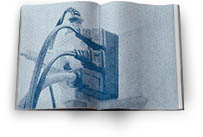Why an Elder Should Oversee the Bookstall
As a lover of history, walking through a museum with rare artifacts thrills me. Museums collect the best artifacts by depending on experts who know their field and seek to tell a trustworthy story.
What does a museum have to do with your church bookstall or library? I am glad you asked.
Both should collect instructive and enjoyable resources. Neither should curate content that fails to give a deeper grasp of reality. When your church’s bookstall overseer isn’t feeding the sheep healthy food, they’re working against the digestion of the church’s entire teaching ministry.
Pastors, the world of Christian and pseudo-Christian books is overwhelming. Please don’t let your people fend for themselves. An elder should oversee your church bookstall. Why?
1. The bookstall magnifies your teaching ministry.
I was always amazed by the errant publications that made their way into the “Christian” section of brick-and-mortar bookstores. While the employees who stocked the shelves may have had good intentions, they did not necessarily have a pastoral ability or responsibility to teach the Word. But you do, pastor. The books your church sells or gives away are an extension of your teaching ministry.
Just like when your people walk through a Smithsonian museum, they should be able to trust that your bookstall will teach the truth. We often think teaching “what accords with sound doctrine” and protects the flock from “fierce wolves” happens exclusively in the pulpit (Titus 2:1; Acts 20:29). But even though the pulpit is the primary way you teach God’s people, it’s not your only tool. The books your church offers will either complement or undermine all your tireless effort in the pulpit.
As pastors, we should love our people by filling the bookstall with reliable books and explaining to the church why we included these books and not others. In doing so, you connect in your people’s minds the doctrine your church teaches gathered with the books they should read scattered. Each book is a wonderful chance to extend your church’s teaching ministry.
2. The bookstall develops discernment.
Bank tellers learn to spot counterfeit bills by closely examining the genuine article. Similarly, a side effect of steeping in reliable resources is developing an allergy to bogus ones. Good books don’t just convey content—they train our sensibilities to discern between the good and the bad. They even help our members identify the areas in which they should grow in knowledge and obedience.
Use the ministry of books to feed your sheep and refine their Christian palates. There are many arenas in which Christians should deepen their faith. A well-curated bookstall helps guard and guide your people in matters of orthodoxy—from subjects like biblical theology to disciplining children, from church history to counseling. Use your bookstall to introduce your people to good authors and foundational genres. After all, they may not encounter such books on their own.
3. The bookstall facilitates discipleship.
Through a well-curated book offering you can provide resources that will equip fathers and mothers to disciple their families, friends to disciple one another, and small group leaders to guide their groups in truth. Elders only have so many man hours. Good books can serve like bumpers in bowling, helping to keep church members within the lines and encouraging them to engage each other with the Word and its application.
Discernment is the friend of discipleship. As your flock reads well, it will make them better thinkers and teachers. And that will strengthen the witness of your church.
4. The bookstall addresses pastoral issues.
Websites may offer great resources, but they don’t know your flock’s particular needs. Maybe you know your church is weak in its understanding of sound doctrine or ecclesiology. Maybe many in your congregation are struggling with pornography or greed.
Good books help pastors care for those for whom they will give an account (Heb. 13:17). They help you shepherd the flock that is among you (1 Pet. 5:2). Someone in your church may be hesitant to talk with you about their struggles or sins but willing to pick up a book you have recommended.
As Christians, we are first and foremost people of the Book. But we should also be a people who use good books that explain and apply the Book. So, fellow pastors, don’t neglect overseeing the resources your church is, or could be, offering. From the Gutenberg printing press that supported the Reformation to the online articles and books that are at our fingertips today, don’t underestimate how our Lord can use written words for the good of his people and the glory of his name. As those entrusted with the oversight of eternal souls, the elders don’t just have the responsibility to oversee what the church reads—they have the privilege.









